Advertisement
Without MASS MoCA, Tanglewood And Other Attractions, Berkshires' Arts Tourism Is Hurting
Resume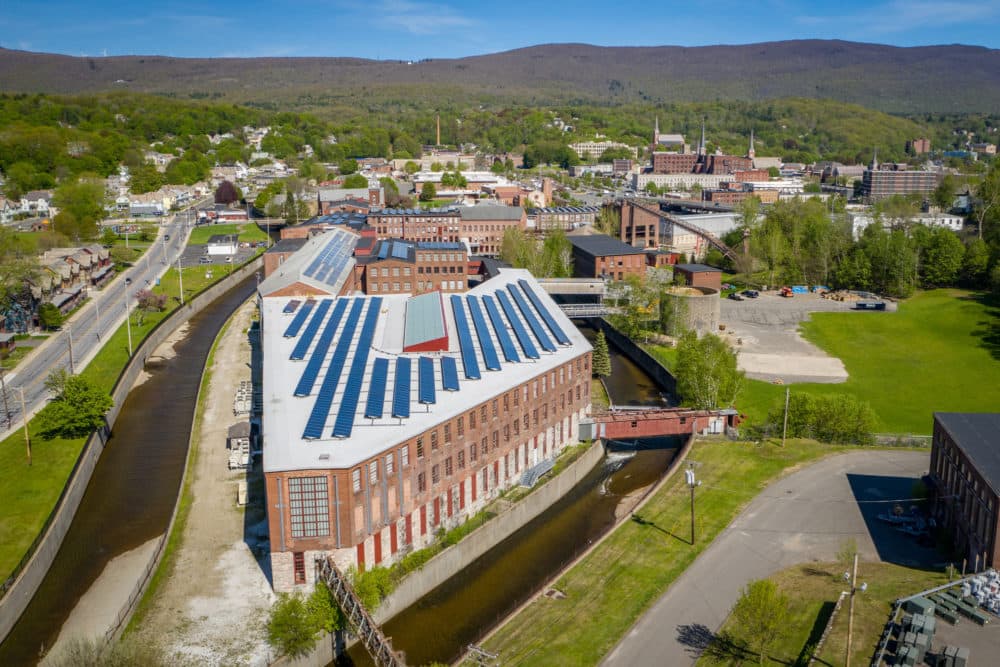
Tourism has been decimated by widespread coronavirus closures. The impact is especially hard felt in regions that rely heavily on seasonal dollars, including the Berkshires in western Massachusetts. It's a place where art, theater and music drive a post-industrial, creative economy now shuttered by the pandemic.
Without Tanglewood
During a normal summer 350,000 visitors stream through the gates at the Tanglewood Music Festival in Lenox. Some take one of the 5,700 seats in the Koussevitzky Music Shed. Thousands more spread out picnic blankets and crack coolers on the lush, manicured lawn.
Tanglewood sits on the grounds of a former estate donated by wealthy patrons to the Boston Symphony Orchestra in 1936. Lenox was home to an iron foundry and a glass factory – now long closed. Inns, cafes and gifts shops have taken their place.
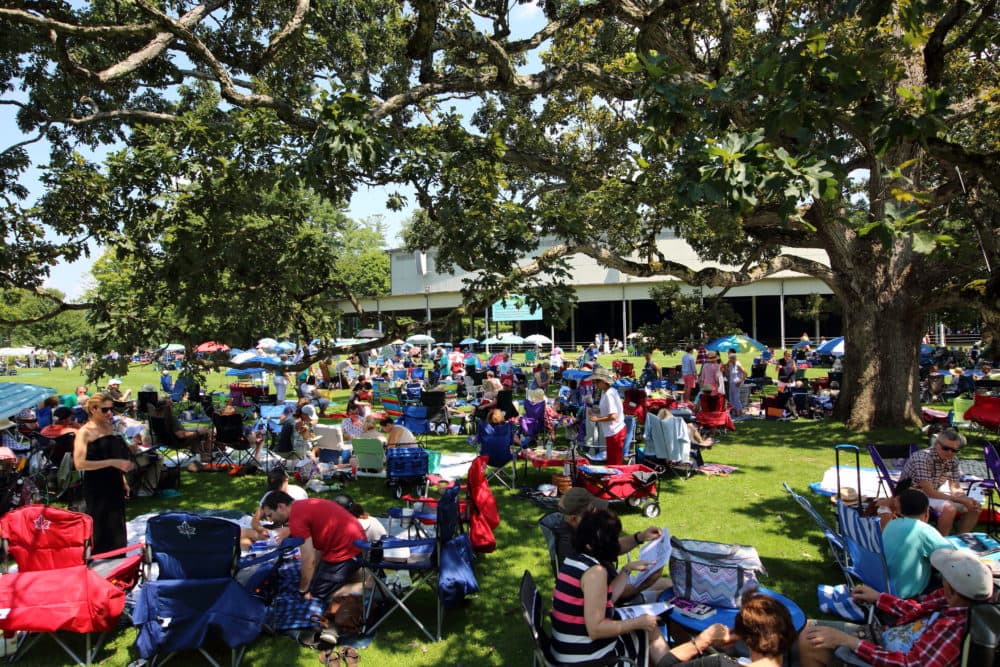
For decades the BSO musicians have performed concerts in the open air on Tanglewood's stage with guest artists ranging from Leonard Bernstein to Yo-Yo Ma. But this year live music will not fill the air in Lenox because of COVID-19.
“The last time Tanglewood missed a whole summer was precipitated by gas and rubber rationing in 1945,” the orchestra's CEO and president Mark Volpe explained. That was during World War II.
Cancelling the 2020 in-person season — which took two years to plan — has kept Volpe up at night worrying about the BSO's financial future and the organization's role in the Berkshires. The mountainous, still-gritty region has a legacy of manufacturing and job loss.
“Back in the late '40s, '50s, even well into the '60s G.E. alone employed 11,000 to 12,000 people,” Volpe said. “They now employ a grand total of zero.”
Most of Tanglewood's 1,000 part-time and seasonal employees have been laid off and a digital version of the festival will be available throughout the summer online. But it won't make up for the fact that Tanglewood usually brings more than $100-million tourist dollars to Western Massachusetts each summer, according to a 2017 Williams College study.
“We're not in a major market that has a diverse economy,” Volpe said, “We are the economy.”
An Economy Anchored In Culture
Over the decades the Berkshires region has redefined itself as a cultural destination with an ecosystem of institutions that anchor the economy. There's the Jacob's Pillow Dance Festival, the Williamstown Theater Festival, Shakespeare & Company and a slew of museums including the Clark Art Institute, the Norman Rockwell Museum and the Massachusetts Museum of Contemporary Art, aka MASS MoCA in North Adams.
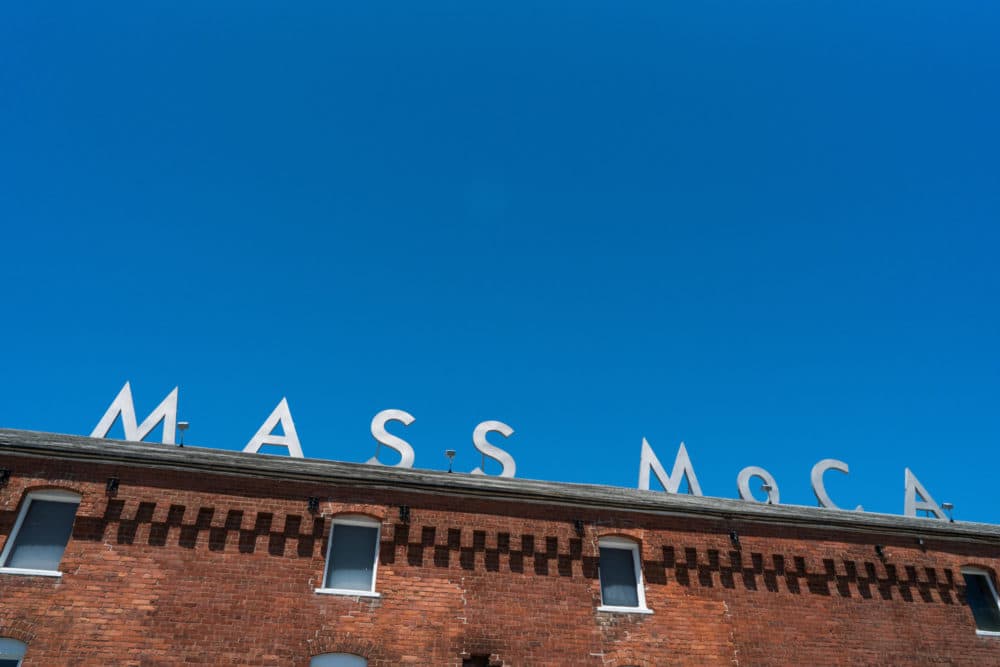
“MASS MOCA is sort of a poster child for the creative economy,” museum director Joe Thompson said.
MASS MoCA occupies more than two dozen renovated 19th century mill buildings about 25 miles from Tanglewood. Thompson said the first few months of 2020 set attendance records. Then in March the pandemic swooped in and began taking its toll.
Since shutting down, Thompson was forced to lay off 122 out of 165 employees. Closing erased ticket sales for museum entry and the live performances that make up 70% of MASS MoCA's revenue. “We did that, it was painful,” Thompson said, “and it was painful for the region.”
MASS MoCA As An Economic Driver
The idea to create a museum in North Adams was born at another devastating time for the community – the mid-1980s. “North Adams found itself at the top of every wrong list,” Thompson recounted. “Teenage pregnancy, illiteracy, domestic violence.” Unemployment also soared as a result of the component company Sprague Electric leaving the city, taking 3,000 jobs with it.
Massachusetts State Representative John Barrett was there for the aftermath. Back then, as he put it, he served as the “blue-collar mayor” of North Adams. Barrett recalled a local newspaper article saying they wouldn't have blamed him if he just closed the curtains at City Hall, turned out the lights and left. In a national magazine article author James Michener described North Adams as a classic example of urban blight in the Northeast. “It was that bad,” Barrett said.
Desperate, he bought into a proposal that a contemporary art museum could save North Adams while helping to lift the region – even if he didn't know what contemporary art was.
“That's when I started to realize that arts and culture – that was economic development,” Barrett said.
He eventually took the concept to then Gov. Michael Dukakis and asked for state funding. “Manufacturing wasn't going to make it in our area anymore,” Barrett explained. “We had to look in a different direction, and most importantly, we had to change the image of our community.”
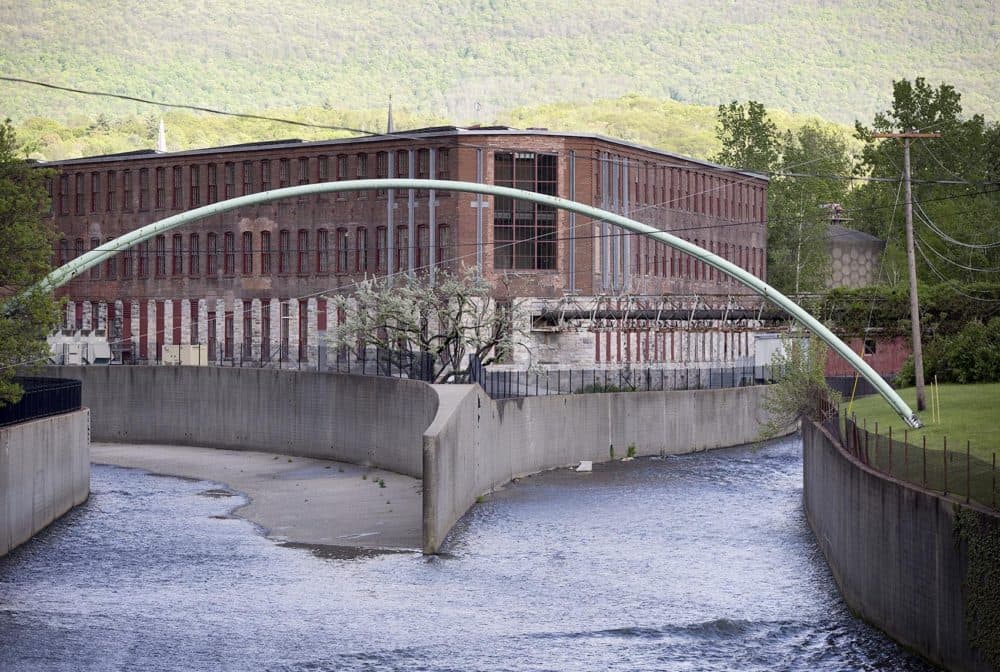
After a bumpy decade strewn with hurdles including a recession, MASS MoCA took over the old Sprague Electric campus buildings and opened in 1999 with help from $35 million in state funding. While the museum hasn't been a silver bullet, Barrett said cultural tourism in and around North Adams has expanded steadily over the past two decades.
COVID-19's Crushing Blow
A Massachusetts Cultural Council survey found the Commonwealth's nonprofit cultural organizations lost more than $55.7 million in March this year. Barrett co-filed two bills requesting $75 million in COVID-19 hardship grants to support the struggling sector, along with the inter-dependent food and hospitality industries that he said have been left in a void by the virus.
The Pioneer Institute has been tracking unemployment in Berkshire Country and in May the number reached 28%. Before the pandemic the visitor economy was on track to push past a billion dollars in direct and indirect spending in 2020, according to Jonathan Butler. He's CEO of the economic development agency 1Berkshire and said many of the small businesses he works with have helped evolve the region into a “hip” cultural destination.
Distilling down from the large anchor institutions there are other key players in the creative economy, including the farm-to-table movement, Butler said. “There's so much creative and artisan activity there,” he explained, Makers, gallery owners and independent artists also contribute to making the cultural ecosystem vibrant in the Berkshires.
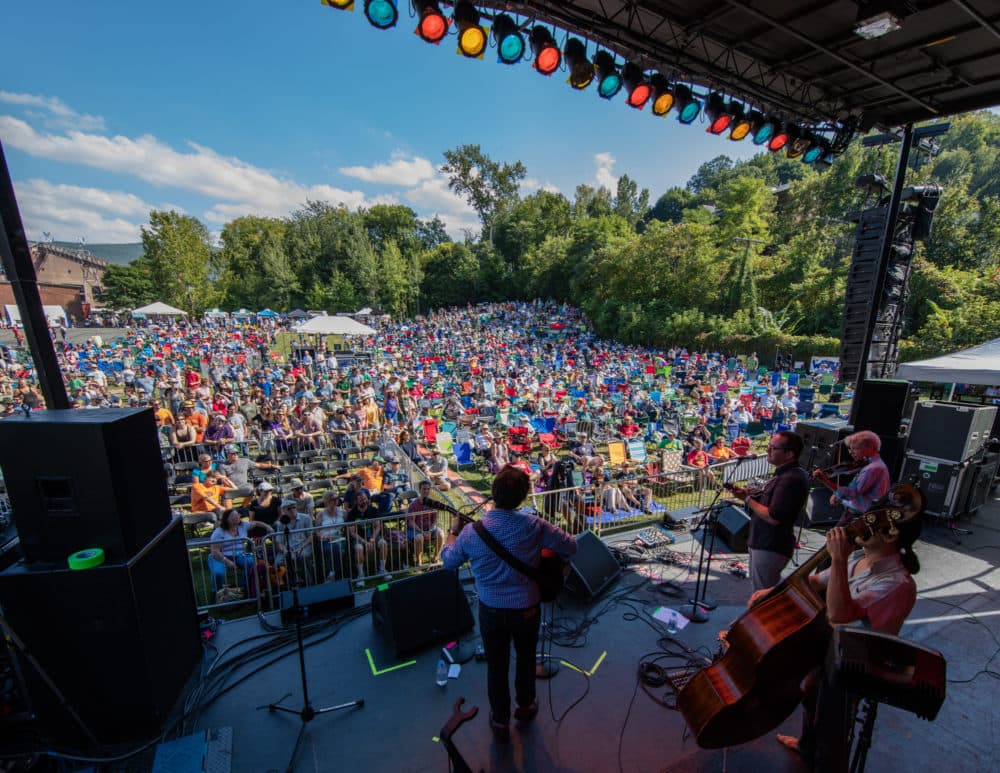
The Creative Economy's Ripple Effect
Restaurants throughout the region experience waves of business during a typical summer, including Spice Root in Williamstown. Owner and chef Stephen Lawrence has been making Indian food there for almost 18 years. This year has been rough on many levels he said, especially with the cancellation of the Williamstown Theater Festival in late June.
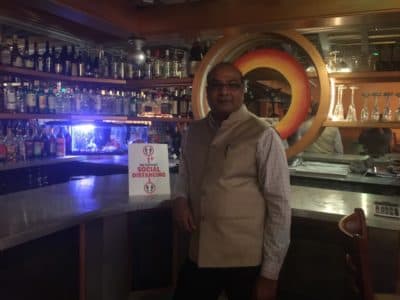
Spice Root usually attracts actors, stage crews and hoards of fans who attend the Tony Award-winning event on Williams College's campus. Without the visiting crowds he suspects he'll see a 30% drop in revenue compared to years past.
“I didn't lay off anybody,” Lawrence said, “because the thing is, as a employer, we are just like a family. So we have to support each other, you know?”
Lawrence has been able to keep his staff working with Payroll Protection Plan loans and the restaurant is offering curbside takeout, but the food stall he runs at MASS MoCA's festivals is not operating. The FreshGrass music festival, a big draw in September, has been postponed until 2021. Lawrence is not alone in lamenting the museum's long list of cancellations.
Baker Alexandra Oster and her chef husband own A-OK Berkshire Barbeque, a small, year-round eatery in a rented space on MASS MoCA's sprawling campus. She remembers walking into the restaurant's dry storage area and sitting on the ground the day the museum announced its closing. “I cried,” Oster said. “I was like, it's over.”
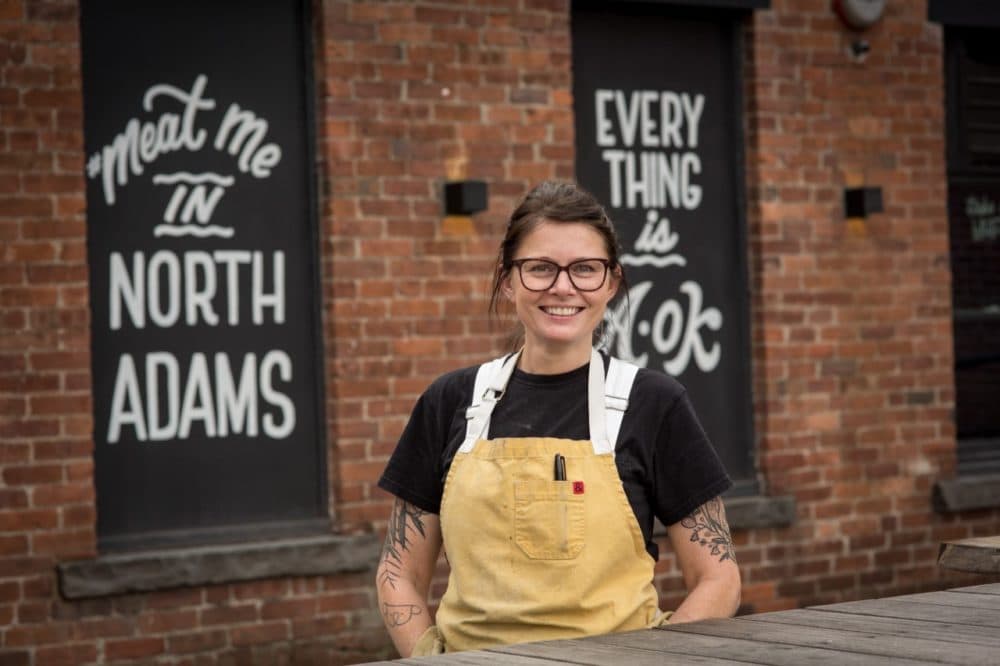
She explained how A-OK depends on museum visitors along with the hungry crowds that come to see live music in the museum's busy performance venue. “We were supposed to have the Violent Femmes on June 5th,” she said. “That would have been massive – it's a ten-thousand person show.”
Like Stephen Lawrence, Oster estimates a revenue drop of about 30%. But serving takeout to the local community has been keeping her spirits up and her restaurant afloat. Oster is trying to be optimistic and is taking the situation one week at a time. She worries about small businesses like hers that rely on money earned during the summer months to get through the quieter seasons.
COVID-19 Closures Illuminate Interconnectedness
“This has cast a really strong light – we all know it – but like a real strong light on our interconnectedness,” Eric Kerns said. He's a partner in the stylish, two-year-old hotel Tourists about two miles from MASS MoCA.
“The Berkshires is a multifaceted organism,” Kerns explained. “What I would describe as the Berkshire summer experience is not the same without Tanglewood, it's not the same without the Williamstown Theater Festival.”
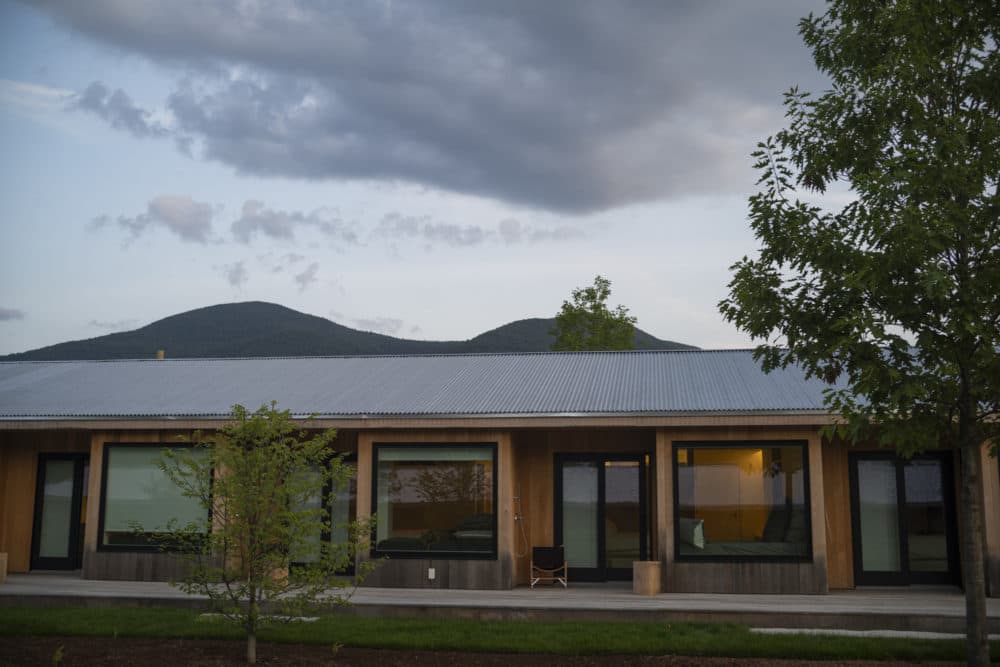
Tourists attracts visitors from all over the Northeast. Phased reopening is underway in Massachusetts, and Kerns' team will be implementing COVID-19 safety protocols for staff (who've been able to remain on payroll since March) and guests when they begin returning to the hotel on July 2.
“We understand that there is certainly a market of people who have been trapped in tenth floor apartments in urban areas for a long time, and that just being able to walk on our hiking trails would be a great gift to them,” Kerns said. “But we're really unsure as to whether it's enough to be able to sustain us for the summer.”
He's been living in North Adams for the past 20 years and used to work at MASS MoCA. Through the pandemic Kerns said Tourists housed frontline workers in the community who didn't want to put their families at risk. While he and his partners (including Wilco bassist John Stirratt) want to get back to business they've been cautious about moving forward.
“We feel a responsibility to the community as an economic engine. And we think about those rooms, and the meal taxes that we collect, and how they go into supporting the city,” Kerns said. “But we also feel an incredible obligation to be protective of this community that has spectacularly low infection rates.”
They want to be on the right side of history, he explained, rather than contributing to a coronavirus surge that takes North Adams – and the Berkshires – back to phase zero.
This segment aired on June 30, 2020.
